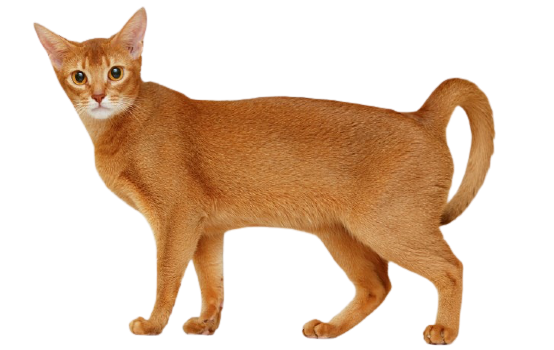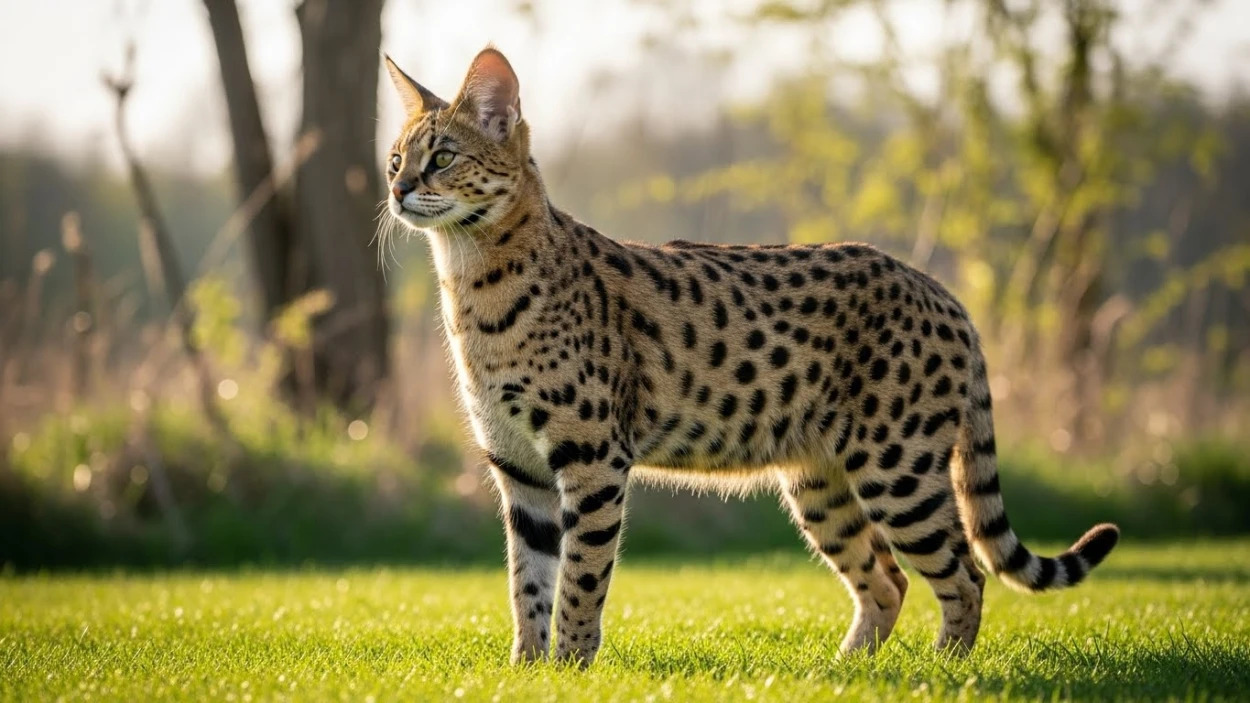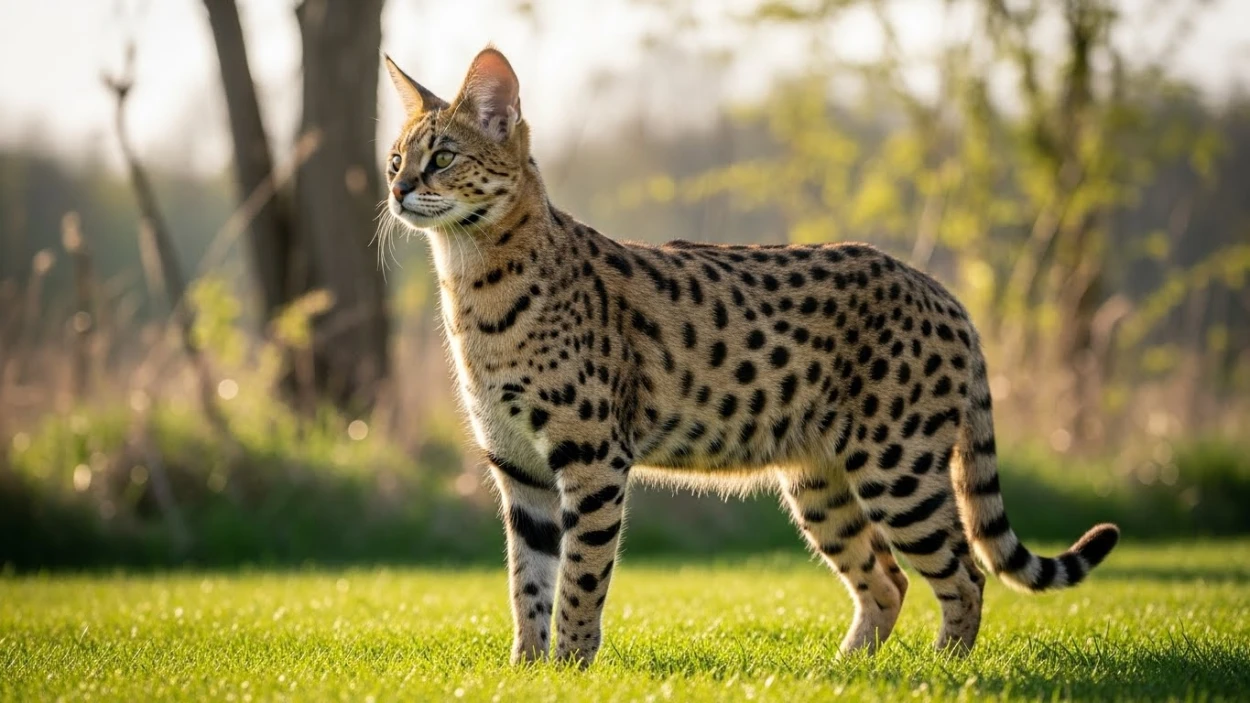Breed Information
| Popularity/Rank | 10 |
|---|---|
| Name | Abyssinian |
| Other names | None |
| Origin | Egypt |
| Size | Medium |
| Coat | Dense, Soft, Shorthair |
| Lap Cat | Yes |
| Lifespan | 14 to 15 years |
| Temperament |
Energetic, Gentle, Independent, Intelligent, Active 1. Energetic: The Abyssinian cat breed is known for its high energy levels and playful nature. These cats are always on the go, and love to play with their toys. They are also very active, and love to run and jump around. 2. Gentle: Despite their high energy levels, Abyssinian cats are actually quite gentle creatures. They are very loving and affectionate towards their owners, and enjoy being petted and cuddled. They are also good with children, making them ideal family pets. 3. Independent: Abyssinian cats are very independent creatures, and do not require a lot of attention from their owners. They are content to spend time on their own, exploring their surroundings or playing with their toys. However, they do enjoy human companionship and will often seek out their owner’s company when they are bored or lonely. 4. Intelligent: The Abyssinian cat breed is known for its intelligence, and these cats are quick learners. They easily pick up new tricks, and can be trained to perform a variety of tasks. Their intelligence also makes them good at problem-solving, so they can be great at keeping themselves entertained when left alone. 5. Active: As well as being intelligent, Abyssinian cats are also very active creatures. They love to run and jump around, and need plenty of space to explore. They also enjoy playing with toys, which helps to keep them mentally stimulated |
| Weight | 8 to 12 pounds |
| Colors | Chocolate, Cinnamon, Fawn, Ruddy, Black |
| Kitten Prices |
USD $900 - $1500
When it comes to Abyssinian kittens, there is a wide range of prices that you will see from different breeders. Generally speaking, you can expect to pay anywhere from $900 to $1500 for one of these kittens. There are a few factors that will impact the price of an Abyssinian kitten from breeder to breeder. The first is the reputation of the breeder. A well-known and respected breeder is going to charge more for their kittens than someone who is just starting out or who has a less stellar reputation. The second factor that will impact price is the quality of the kitten. A breeder who breeds top-quality Abyssinians is going to charge more for their kittens than someone who is breeding lower quality cats. The third factor that will impact price is the parents of the kitten. If the parents are show-quality cats, then the kitten is going to be more expensive than if they are not. Finally, the fourth factor that will impact price is whether or not the kitten has been spayed or neutered. A kitten that has not been spayed or neutered will be more expensive than one that has already had this done. So, what does all this mean when you are trying to decide whether or not an Abyssinian cat is right for you? First, you need to consider your budget and what you are willing to spend on a cat. If you have your heart set on an Abyssinian, then you need to be prepared to pay at least $900 for a kitten. Second, you need to decide what level of quality you are looking for in a cat. If you want a top-quality cat with show-quality parents, then you should expect to pay at least $1500 for your kitten. Third, you need to decide whether or not you are willing to have your cat spayed or neutered before bringing them home with you. If not, then be prepared to pay more for your kitten up front. Finally, fourth and lastly, make sure that you do your research on any breeder that you are considering purchasing an Abyssinian kitten from so that you can be sure that they are reputable and trustworthy |
Breed Characteristics
| Adaptability | |
|---|---|
| Affection Level | |
| Child Friendly | |
| Dog Friendly | |
| Energy Level | |
| Grooming | |
| Health Issues |
Feline infectious peritonitis, feline leukemia, feline immunodeficiency virus, feline infectious anemia, feline infectious rhinotracheitis Is Abyssinian cat Hypoallergenic? The Abyssinian cat is a popular breed of domestic cat. It is known for its intelligence, playful personality, and striking appearance. The Abyssinian is also known to be hypoallergenic, which means that it is less likely to cause an allergic reaction in people who are allergic to cats. Feline infectious peritonitis (FIP) is a viral disease that affects cats. The virus that causes FIP is a member of the coronavirus family, and is closely related to the virus that causes feline infectious respiratory disease (also known as "sniffles" or "cat cold"). FIP is a serious disease, and can be fatal. There is no cure for FIP, and there is no effective treatment. Feline leukemia (FeLV) is a virus that can infect cats. FeLV is a serious disease, and can be fatal. There is no cure for FeLV, and there is no effective treatment. Feline immunodeficiency virus (FIV) is a virus that can infect cats. FIV is a serious disease, and can be fatal. There is no cure for FIV, and there is no effective treatment. Feline infectious anemia (FIA) is a viral disease that affects cats. FIA is a serious disease, and can be fatal. There is no cure for FIA, and there is no effective treatment. Feline infectious rhinotracheitis (FVR) is a viral disease that affects cats. FVR is a serious disease, and can be fatal. There is no cure for FVR, and there is no effective treatment. |
| Intelligence | |
| Shedding | |
| Social Needs | |
| Stranger Friendly | |
| Vocalization | |
| Health Care |
Abyssinian cats are a relatively healthy breed, but like all cats, they are susceptible to certain health problems. Some of the most common health problems seen in Abyssinians include respiratory infections, eye problems, and gastrointestinal issues.
To help keep your Abyssinian cat healthy, it is important to provide them with regular veterinary care. This includes routine vaccinations and check-ups, as well as prompt treatment if your cat becomes ill. You should also feed your Abyssinian cat a high-quality diet and keep them up-to-date on parasite prevention. By taking good care of your Abyssinian cat, you can help them enjoy a long and healthy life. |
History
The Abyssinian cat is a beautiful, unique breed that has a long and interesting history. The breed almost became extinct at one point, but has since become popular again. The ancestry of the Abyssinian cat is fascinating, and the breed is recognized as a distinct breed from its place of origin.
The Abyssinian cat is thought to have originated in Ethiopia, which is why it is sometimes called the Ethiopian cat. The first recorded mention of an Abyssinian cat was in 1868, when an Englishman named Colonel Gordon brought one back to England from Abyssinia (now Ethiopia). It is believed that Gordon's cat was part of a litter of kittens that were born to a wild cat and a domestic cat.
The Abyssinian breed almost became extinct in the early 1900s due to World War I. ManyAbyssinian cats were killed during the war, and those that survived were often sold as pets or used for breeding purposes. As a result, the gene pool for the breed became very small. In order to save the breed, some Abyssinians were imported from other countries, such as Australia and America. This helped to increase the genetic diversity of the breed and eventually led to its resurgence in popularity.
The ancestry of the Abyssinian cat is still somewhat mysterious. However, it is believed that the modern-day Abyssinian descends from cats that were brought to Ethiopia from Egypt centuries ago. These cats would have then interbred with local wild cats, resulting in the unique appearance of the Abyssinian we know today.
From its place of origin in Ethiopia, the Abyssinian cat has been recognized as a distinct breed by several major organizations, including The International Cat Association (TICA) and The Cat Fanciers' Association (CFA). TheAbyssinian is now one of the most popular breeds of cats in both America and Europe.
Description
The Abyssinian cat is a medium-sized, short-haired breed of domestic cat with a distinctive "ticked" tabby coat. There are many stories about the origins of the Abyssinian, but the most likely is that it originated in Ethiopia and was brought to Europe by British soldiers in the late 1800s. The Abyssinian is one of the oldest known breeds of domestic cat, and its appearance has changed very little over the centuries.
The Abyssinian is a lithe and graceful cat with a long, slender body and elegant features. The head is relatively small and triangular, with large ears that are set wide apart. The eyes are almond-shaped and expressive, ranging in color from green to gold. The coat is short and fine, with a distinctive "ticked" pattern that gives the impression of tiny stripes running through the fur. The coat comes in a variety of colors, including blue, cinnamon, fawn, red, ruddy, and silver.
The Abyssinian is an active and playful cat that loves to explore its surroundings. They are curious by nature and can be quite mischievous at times. They are also very affectionate with their family and love to be involved in everything that is going on around them. Abyssinians get along well with other cats and dogs, as well as children and other animals.
The Abyssinian is generally healthy breed of cat, but like all breeds they are susceptible to certain health conditions such as gingivitis (inflammation of the gums), pyruvate kinase deficiency (an inherited blood disorder), hip dysplasia (a condition that can cause lameness), and progressive retinal atrophy (a degenerative eye condition). It is important to work with a reputable breeder to ensure that your kitten comes from healthy stock.
The Abyssinian is an adaptable breed of cat that does well in both indoor and outdoor environments. They are active cats who need plenty of space to run and play. They also enjoy climbing and perching on high places, so homes with plenty of vertical space are ideal for them.Abyssinians make great pets for families who are looking for an affectionate yet independent companion.






